Module10知识点总结及练习
10.7Module10模块小结(练习)

Module10 Australia模块小结思维导图知识要点一:重点单词,短语及句。
要点1 according toaccording to根据;按照;据……所说例:According to the local people, it's a special and magical place. 当地人认为它是一个特殊而神奇的地方。
【考点】according to主要用来表示“根据”某学说、某书刊、某文件、某人所说等或表示“按照”某法律、某规定、某惯例、某情况等。
【注意】according to后面不接view, opinion等表示“看法”的词。
according as,意为“根据”“随……而定”,后接从句。
【注意】对于那些由what, which, whether, how, when, where等引导的句子,其前要用according to,不用according as。
【典例分析】1.根据你工作的好坏,你会得到表扬或批评。
You will be praised or blamed _________ ___________your work is good or bad.【点拨】according as 意为“根据”“随……而定”,后接从句。
2.根据大家所说,他是位诚实的商人。
He is an honest businessman, ________ ___________what everyone says.【点拨】according to 对于那些由what, which, whether, how, when, where等引导的句子,其前要用according to,不用according as。
3.它们是按发生的时间安排的。
They were arranged ________ ________when they happened.【点拨】according to对于那些由what, which, whether, how, when, where等引导的句子,其前要用according to,不用according as。
Module10__知识点总结
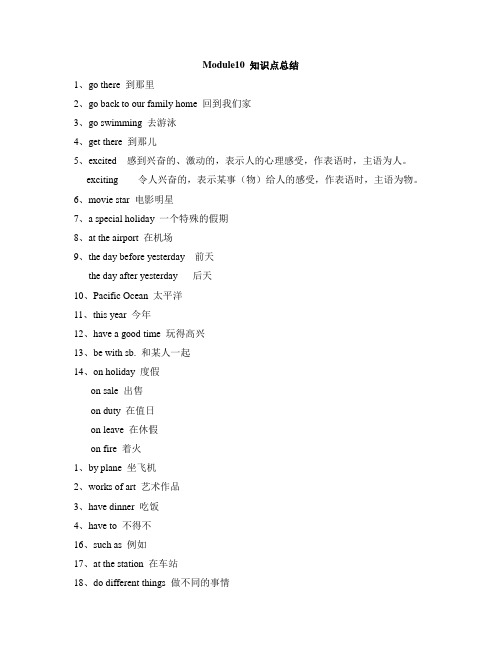
Module10 知识点总结1、go there 到那里2、go back to our family home 回到我们家3、go swimming 去游泳4、get there 到那儿5、excited 感到兴奋的、激动的,表示人的心理感受,作表语时,主语为人。
exciting 令人兴奋的,表示某事(物)给人的感受,作表语时,主语为物。
6、movie star 电影明星7、a special holiday 一个特殊的假期8、at the airport 在机场9、the day before yesterday 前天the day after yesterday 后天10、Pacific Ocean 太平洋11、this year 今年12、have a good time 玩得高兴13、be with sb. 和某人一起14、on holiday 度假on sale 出售on duty 在值日on leave 在休假on fire 着火1、by plane 坐飞机2、works of art 艺术作品3、have dinner 吃饭4、have to 不得不16、such as 例如17、at the station 在车站18、do different things 做不同的事情19、spend all day 花整天时间spend 与takespend 主语必须是人,常用于spend tine / money on sth.“ 在…上花费时间/金钱”,或spend time/money (in) doing sth.“花费时间/金钱做某事”。
take 常用句型为:It takes sb.+时间+to do sth.表示“做某事花了某人多少时间”。
20、take lots of photos 照许多照片21、go with sb. 与某人一起去22、take a walk 散步23、street market 街头市场24、do shopping 购物25、all day 整天26、wait in line排队等候cut in line 插队27、at the top of 在…顶端28、how long 表示“多久,多长时间”,用来提问时间的长短,常用“for+一段时间”或“since+时间点/一段时间+ago”或“si nce+从句”作答。
Module 10课文知识点总结(含语法)-外研版八年级下册英语
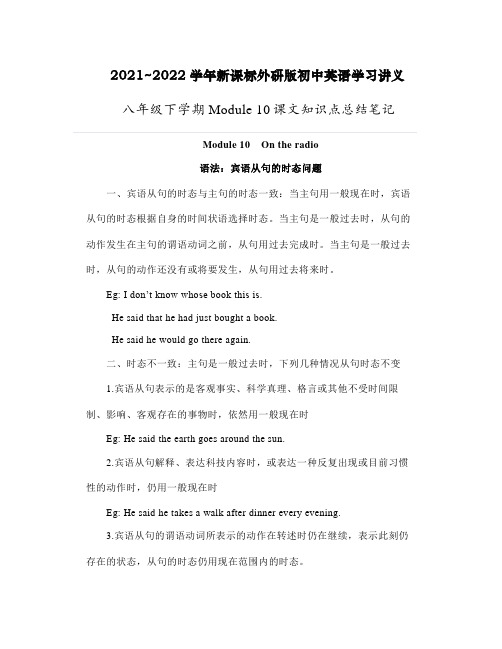
2021~2022学年新课标外研版初中英语学习讲义八年级下学期Module 10课文知识点总结笔记Module 10 On the radio语法:宾语从句的时态问题一、宾语从句的时态与主句的时态一致:当主句用一般现在时,宾语从句的时态根据自身的时间状语选择时态。
当主句是一般过去时,从句的动作发生在主句的谓语动词之前,从句用过去完成时。
当主句是一般过去时,从句的动作还没有或将要发生,从句用过去将来时。
Eg: I don’t know whose book this is.He said that he had just bought a book.He said he would go there again.二、时态不一致:主句是一般过去时,下列几种情况从句时态不变1.宾语从句表示的是客观事实、科学真理、格言或其他不受时间限制、影响、客观存在的事物时,依然用一般现在时Eg: He said the earth goes around the sun.2.宾语从句解释、表达科技内容时,或表达一种反复出现或目前习惯性的动作时,仍用一般现在时Eg: He said he takes a walk after dinner every evening.3.宾语从句的谓语动词所表示的动作在转述时仍在继续,表示此刻仍存在的状态,从句的时态仍用现在范围内的时态。
Eg: She told me the other day that she is only eight.4.从句中有具体的时间状语,动作是发生在主句动作之前,仍用一般过去时,不改为过去完成时Eg: He said that he was born in 1998.1.Thank you for… = Thanks for + 名词、代词、动词ing因…而感谢2.show… around = take… around= take… to visit带…参观Eg: Can you show/ take us around your factory?= Can you take us to visit your factory?e this way 这边请4.be on (灯等)亮;(电影等)上映5.mean to do sth. 想或企图做某事mean doing sth. 意味着做某事mean (v.)--- meaning (n.) 意思Eg: I had meant to visit you, but I was too busy.My new job will mean travelling all over the world.6.on air 正在广播Eg: We will be on air in ten minutes.7.avoid doing sth. 避免做某事avoid 后接名词、代词或动名词Eg: You should avoid making the same mistakes.avoid (v.) 回避;避开Eg: Everyone seemed to be avoiding him.avoid(v.) 逃避Eg: You should avoid over-spending.8.make some noise 制造噪音9.the latest national and international news 最新的国内、国际新闻10.get crazy 令人发狂be crazy about…热衷于;迷恋于like crazy 发狂似的;极度地go crazy变得疯狂drive sb. crazy 让某人疯狂11.keep doing sth. 不断做某事12.do interview with sb.= interview sb. 采访某人interview --- interviewer 采访者/ interviewee被采访者13.keep quiet 保持安静14.if (1) “如果”引导条件状语从句,如果放在主句前,从句要用逗号与主句隔开Eg: I won’t go by plane if it rains tomorrow.If you want to go, please tell me.(2)if所引导的条件句,要遵循“主将从现”原则Eg: If it doesn’t rain tomorrow, we’ll go to the Great Wall.(3) if引导的条件句,当条件成立必然有某种结果时,主句和从句用一般现在时Eg: If you drop a glass, it breaks.(4)if “是否”时,不用主将从现Eg: I don’t know if it will rain tomorrow.15.against (prep.) “以…为竞争对手;与…对抗”后接名词、代词、动词ingEg: Yesterday we played against a very strong team and we won.反对;对抗Eg: My father is against my plan.16.t he end of……的尾声at the end of…在…末端by the end of…直到…为止in the end 最后;最终1.look down at…低下头看look down upon 瞧不起2.Shouldn’t you be at school?你不用上学吗?这是一个否定疑问句,用于表示惊奇。
六年级上册Module 10知识梳理
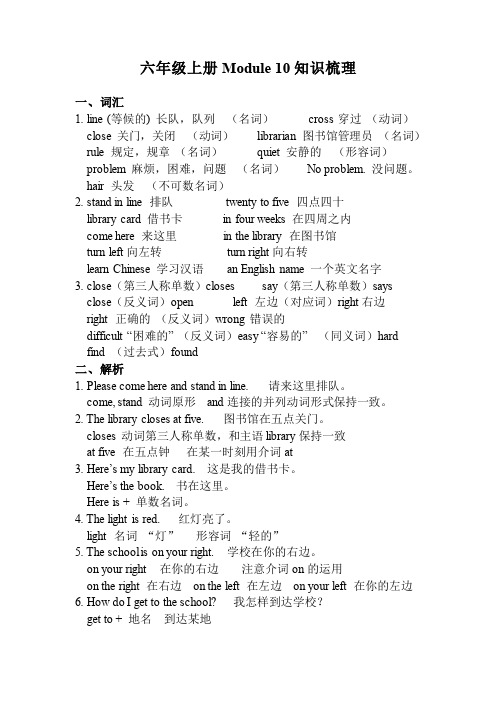
六年级上册Module 10知识梳理一、词汇1. line (等候的) 长队,队列(名词)cross 穿过(动词)close 关门,关闭(动词)librarian 图书馆管理员(名词)rule 规定,规章(名词)quiet 安静的(形容词)problem 麻烦,困难,问题(名词)No problem. 没问题。
hair 头发(不可数名词)2. stand in line 排队twenty to five 四点四十library card 借书卡in four weeks 在四周之内come here 来这里in the library 在图书馆turn left向左转turn right向右转learn Chinese 学习汉语an English name 一个英文名字3. close(第三人称单数)closes say(第三人称单数)says close(反义词)open left 左边(对应词)right右边right 正确的(反义词)wrong 错误的difficult “困难的”(反义词)easy “容易的” (同义词)hard find (过去式)found二、解析1. Please come here and stand in line. 请来这里排队。
come, stand 动词原形and连接的并列动词形式保持一致。
2. The library closes at five. 图书馆在五点关门。
closes 动词第三人称单数,和主语library保持一致at five 在五点钟在某一时刻用介词at3. Here’s my library card. 这是我的借书卡。
Here’s the book. 书在这里。
Here is + 单数名词。
4. The light is red. 红灯亮了。
light 名词“灯”形容词“轻的”5. The school is on your right. 学校在你的右边。
Module10 基础知识梳理
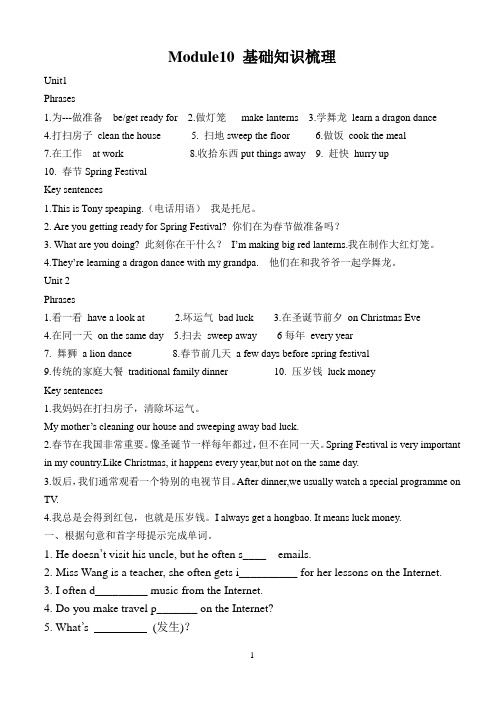
Module10 基础知识梳理Unit1Phrases1.为---做准备be/get ready for2.做灯笼make lanterns3.学舞龙learn a dragon dance4.打扫房子clean the house5. 扫地sweep the floor6.做饭cook the meal7.在工作at work 8.收拾东西put things away 9. 赶快hurry up10. 春节Spring FestivalKey sentences1.This is Tony speaping.(电话用语)我是托尼。
2. Are you getting ready for Spring Festival? 你们在为春节做准备吗?3. What are you doing? 此刻你在干什么?I’m making big red lanterns.我在制作大红灯笼。
4.They’re learning a dragon dance with my grandpa. 他们在和我爷爷一起学舞龙。
Unit 2Phrases1.看一看have a look at2.坏运气bad luck3.在圣诞节前夕on Christmas Eve4.在同一天on the same day5.扫去sweep away 6每年every year7. 舞狮a lion dance 8.春节前几天a few days before spring festival9.传统的家庭大餐traditional family dinner 10. 压岁钱luck moneyKey sentences1.我妈妈在打扫房子,清除坏运气。
My mother’s cleaning our house and sweeping away bad luck.2.春节在我国非常重要。
像圣诞节一样每年都过,但不在同一天。
Spring Festival is very important in my country.Like Christmas, it happens every year,but not on the same day.3.饭后,我们通常观看一个特别的电视节目。
Module 10 Unit 2 Don't shout please!语法复习+巩固练习(含答案)

Module 10 Unit 2 Don't shout please!语法复习+巩固练习语法复习知识考点一:【重点解析】●这句话省略了主语,表示命令,是个祈使句。
●祈使句是用来表示请求、命令、激请、劝告或建议等的句子。
●祈使句的分类:(1)Do型祈使句肯定结构:动词原形+其他.否定结构:Don't+动词原形+其他.例:Clean the blackboard,please.请擦黑板。
Don't clean the blackboard,please.请不要擦黑板。
【小贴士】祈使句句首或句尾加上please可以表示礼貌或客气。
例:Please pass me the plate.请递给我那个盘。
(2)Be型祈使句肯定结构:Be+表语(名词或形容词)(+其他).否定结构:Don't+be+表语(名词或形容词)(+其他).例:Be quiet.安静。
Don't be noisy.不要吵闹。
(3)Let型祈使句肯定结构:Let+宾语+动词原形+其他.否定结构:Don't +let+宾语+动词原形+其他.例:Let me have a rest.让我休息一下。
Don't let the boy have a rest.让这个男孩儿休息。
(4)No型祈使句句型结构:No+其他!例:No parking!禁止停车!知识考点二:一般过去时的概念:一般过去时表示过去某个时间发生的动作或存在的状态。
常和表示过去的时间状语连用,如:last year,yesterday等。
例:I saw him in the street yesterday.昨天我在街上看见他了。
一般过去时的结构:1、肯定形式:主语+动词过去式+其他例:She often came to help us in those days.2、否定形式:①was/were+not;②在行为动词前加didn't,同时还原行为动词。
Module10SpringFestival知识点讲解精选精练英语七年级上册

Module 10 Spring Festival 知识点讲解重点短语:1.get / be ready for...... 为......做准备get/be A ready for B 为B准备A2.Spring Festival 春节3.make big red lanterns 制作大红灯笼4.learn a dragon dance 学舞龙5.clean the house 打扫房屋6.sweep the floor 打扫地板7.cook the meal 烹调食物8.be busy with sth 忙于某事be busy doing sth 忙于做某事9.be at work=be working 正在工作10.put sth away 把......放好; 整理......11.work hard 努力工作;study hard 努力学习12.jion sb 加入(某些人)13.hurry up 快点,赶快14.hurry to +地点匆忙到 ......hurry to do sth 匆忙做某事in a hurry 匆忙的15.sweep away bad luck 扫除霉运16.have a look at... =look at... 看一下......17.celebrate Spring Festival 庆祝春节18.have a traditional family dinner 吃一顿传统的家庭团圆饭19.so much +不可数如此多的......(不可数名词) so many +可数如此多的......(可数名词)20.watch a special programme on TV 在电视里看一个特别的节目21.wear new clothes 穿着新衣服22.lucky money 压岁钱23.have a big family dinner 吃一顿丰盛的家庭团圆饭24.traditional food 传统食品25.on Christmas Day 在圣诞节26.Merry Christmas 圣诞快乐27.say happy new year to sb 祝某人新年快乐28.learn a lion dance 学习舞狮29.get presents from... 从......收到礼物30.at Lantern Festival 在元宵节重点句子:1.Hi, Lingling. This is Tony speaking. 您好,玲玲。
Module10模块知识梳理九年级英语上册

知识点一 重点短语 知识点二 重点句型知识点三 重点语法 Module 10 Australia 知识梳理according to 根据;按照;据……所说sailing boat 帆船keep sb. / sth. away (使)避开;(使)不靠近cut sth. off sth. 把某物从某物上剪掉keep a diary 写日记at the time 那时;在那段时间be surprised at ... 对……感到惊奇at the moment 此刻;目前have a close relationship with ... 与……关系密切in many ways 在很多方面lie in the sun 躺在阳光下in one’s own way 用某人自己的方式for example 例如worry about ... 担心……go horse riding 骑马be left far behind ... 被远远地甩在……后面ask sb. to do sth. 要求某人做某事write a letter to sb. 给某人写信be used to do sth. 被用来做某事that 引导的定语从句考点1概念:修饰某一个名词或代词的从句叫定语从句。
e.g. This is an interesting book.这是一本有趣的书。
(形容词interesting 作定语。
)This is a book that has beautiful pictures.这是一本有漂亮图画的书。
(句中that has beautiful pictures 作定语, 修饰book。
)如果把This is a book. 和The book has beautiful pictures. 合并为一个句子, 就可得到:This is a book that has beautiful pictures.这是一本有漂亮图画的书。
外研版英语八年级上册Module-10知识点及练习题(含答案)

外研版英语八年级上册Module10 The weather知识点单词短语1.on the lake 在湖面上2.quite a lot 相当多,非常多e on 快点,赶快4.almost几乎5.make sure务必6.the centre of…..的中心7.be born in sp./on+日子8.pay… for …为….付费9.during the day在白天10.more than超过11.all year round 全年12.take place=happen发生13.from time to time 时不时地14.so… that 如此…..以至于15.Sounds great!听起来不错pared to =compared with与…相比较17.t ake photos of … 给……拍照18.雨雪的大用heavy 风的大用strong19.had better do sth.最好做某事had better not do sth.20.Better get going最好现在走21.though/although虽然but但是(不可以同时出现)22.have a good time=enjoy oneself23.也: as well; also; too; either ; as well as + sth.24.one of 最高级+可数名词复数+V单数25.bring sb. around sp.= take sb. around sp.带某人到处参观26.the best place to do sth. the best time to do sth.27.What’s the weather like? =H ow is the weather?What will the weather be like? = How will the weather be?28.You must be joking!=You can’t be serious.你开玩笑的吧!29.季节/年份/月份/前+in 日期前+on 星期几前+on30.n. cloud rain wind snow storm shower sunadj. cloudy rainy windy snowy stormy showery sunny 31.neither……nor…… 既不……也不……(两者都不)either……or…… 或者……或者……(两者之一)这两个短语在判断主谓一致时遵循就近原则。
Module10Australia重点知识练习2023-2024学年九年级英语上册
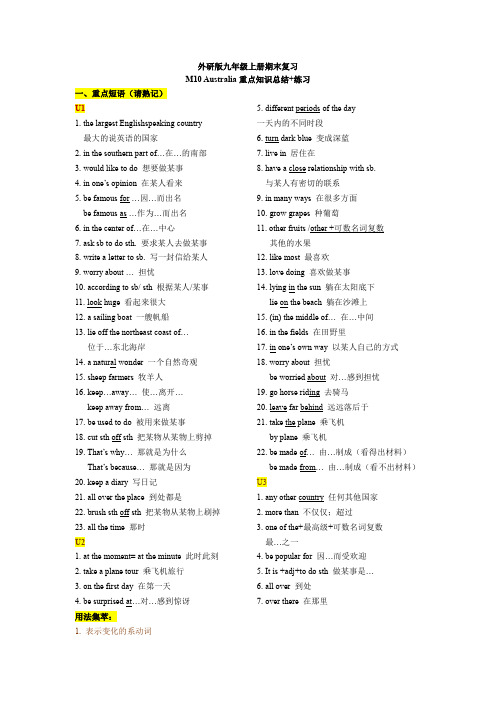
外研版九年级上册期末复习M10 Australia重点知识总结+练习一、重点短语(请熟记)U11. the largest Englishspeaking country最大的说英语的国家2. in the southern part of…在…的南部3. would like to do 想要做某事4. in one’s opinion 在某人看来5. be famous for …因…而出名be famous as …作为…而出名6. in the center of…在…中心7. ask sb to do sth. 要求某人去做某事8. write a letter to sb. 写一封信给某人9. worry about … 担忧10. according to sb/ sth 根据某人/某事11. look huge 看起来很大12. a sailing boat 一艘帆船13. lie off the northeast coast of…位于…东北海岸14. a natural wonder 一个自然奇观15. sheep farmers 牧羊人16. keep…away… 使…离开…keep away from… 远离17. be used to do 被用来做某事18. cut sth off sth 把某物从某物上剪掉19. That’s why… 那就是为什么That’s because… 那就是因为20. keep a diary 写日记21. all over the place 到处都是22. brush sth off sth 把某物从某物上刷掉23. all the time 那时U21. at the moment= at the minute 此时此刻2. take a plane tour 乘飞机旅行3. on the first day 在第一天4. be surprised at…对…感到惊讶5. different periods of the day一天内的不同时段6. turn dark blue 变成深蓝7. live in 居住在8. have a close relationship with sb.与某人有密切的联系9. in many ways 在很多方面10. grow grapes 种葡萄11. other fruits /other +可数名词复数其他的水果12. like most 最喜欢13. love doing 喜欢做某事14. lying in the sun 躺在太阳底下lie on the beach 躺在沙滩上15. (in) the middle of… 在…中间16. in the fields 在田野里17. in one’s own way 以某人自己的方式18. worry about 担忧be worried about 对…感到担忧19. go horse riding 去骑马20. leave far behind 远远落后于21. take the plane 乘飞机by plane 乘飞机22. be made of… 由…制成(看得出材料)be made from… 由…制成(看不出材料)U31. any other country 任何其他国家2. more than 不仅仅;超过3. one of the+最高级+可数名词复数最…之一4. be popular for 因…而受欢迎5. It is +adj+to do sth 做某事是…6. all over 到处7. over there 在那里用法集萃:1. 表示变化的系动词①bee表示“变成”,比较正式,通常表示“变”这个动作已经完成:He had a long walk and became tired. 他走了很远的路,累了。
外研版英语八年级上册Module 10单元知识点归纳总结(详细版)
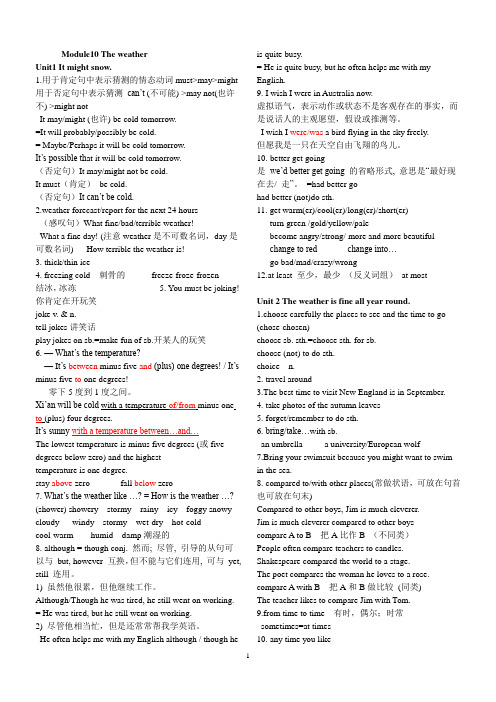
Module10 The weatherUnit1 It might snow.1.用于肯定句中表示猜测的情态动词must>may>might 用于否定句中表示猜测can’t (不可能) >may not(也许不) >might notIt may/might (也许) be cold tomorrow.=It will probably/possibly be cold.= Maybe/Perhaps it will be cold tomorrow.It’s possible th at it will be cold tomorrow.(否定句)It may/might not be cold.It must(肯定)be cold.(否定句)It can’t be cold.2.weather forecast/report for the next 24 hours(感叹句)What fine/bad/terrible weather!What a fine day! (注意weather是不可数名词,day是可数名词) How terrible the weather is!3. thick/thin ice4. freezing cold 刺骨的freeze-froze-frozen结冰,冰冻 5. You must be joking! 你肯定在开玩笑joke v. & n.tell jokes讲笑话play jokes on sb.=make fun of sb.开某人的玩笑6. —What’s the temperature?— I t’s between minus five and(plus) one degrees! / It’s minus five to one degrees!零下5度到1度之间。
Xi’an will be cold with a temperature of/from minus one to (plus) four degrees.It’s sunny with a temperature between…and…The lowest temperature is minus five degrees (或five degrees below zero) and the highesttemperature is one degree.stay above zero fall below zero7. What’s the weather like …? = How is the weather …? (shower) showery stormy rainy icy foggy snowy cloudy windy stormy wet-dry hot-coldcool-warm humid damp潮湿的8. although = though conj. 然而; 尽管, 引导的从句可以与but, however 互换,但不能与它们连用, 可与yet, still 连用。
八年级英语上册知识讲义-重点单词(Module 10 The weather)附练习及答案-外研版

初中英语重点单词(Module 10 The weather)知识梳理cloud n. 云minus a. 负的,零下的shower n. 阵雨degree n. 度snow n. & v . 雪;下雪although conj. 尽管storm n. 暴风雨wet a. 湿的cloudy a. 多云的neither adv. 也不rainy a. 多(下)雨的terrible a. 可怕的snowy a. 多(下)雪的wish v. 希望sunny a. 晴朗的probably adv. 或许windy a. 多(刮)风的come on 快点skate v. 滑冰mile n. 英里thick a. 厚的round adv. 围绕地ice n. 冰northwest n. & a. 西北(的)joke n. & v. (说)笑话southeast n. & a. 东南(的)might aux. & v. 可能from time to time 有时temperature n. 温度二、重点单词【单词学习】1. park ☆☆☆【用法】n. 公园【例句】We are going to the park to skate.我们要去公园滑冰。
【拓展】park的含义除了“公园”外,还可以解释成“停车”。
You can’t park your car here.park, drive, neutral, reverse还有就是可以翻译成韩国姓氏“朴”,如韩国总统朴槿惠的名字是:Park Geun-hye【考题链接】请判断下列park的含义:1. Can I park my car here?2. Is there a parking lot?3. I will park my car outside the park.答案:1. 停车 2. 停车场 3. 前者为停车,后者是公园思路分析:根据句子含义和结构来判断。
外研版六年级英语上册Module10单词,短语,句子及练习
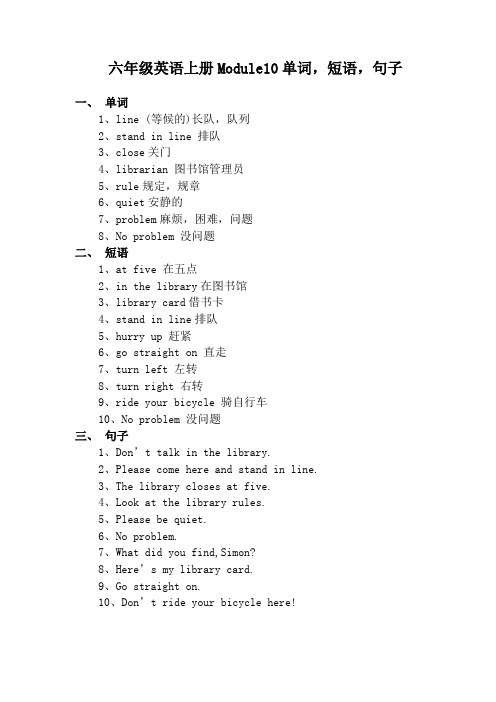
六年级英语上册Module10单词,短语,句子一、单词1、line (等候的)长队,队列2、stand in line 排队3、close关门4、librarian 图书馆管理员5、rule规定,规章6、quiet安静的7、problem麻烦,困难,问题8、No problem 没问题二、短语1、at five 在五点2、in the library在图书馆3、library card借书卡4、stand in line排队5、hurry up 赶紧6、go straight on 直走7、turn left 左转8、turn right 右转9、ride your bicycle 骑自行车10、No problem 没问题三、句子1、Don’t talk in the library.2、Please come here and stand in line.3、The library closes at five.4、Look at the library rules.5、Please be quiet.6、No problem.7、What did you find,Simon?8、Here’s my library card.9、Go straight on.10、Don’t ride your bicycle here!四、重点、难点1、图书馆的规章制度2、交通规则五、Execises一、短语1、在五点__________________2、没问题__________________3、骑自行车___________________4、在图书馆__________________5、借书卡__________________6、排队__________________7、赶紧__________________8、直走__________________9、左转__________________10、右转__________________二、情景写话1、你想说在图书馆不可以说话,怎么表达:______________________________________________ 2、你想问Simon,我们将要去哪里,你怎么问:______________________________________________ 3、你想表达这是你的借书卡,你怎么说:______________________________________________ 4、你想说不要在这里骑自行车,你怎么说:______________________________________________ 5、你想对大家说请看图书馆的规章,你怎么表达:______________________________________________。
Module10状元课堂全笔记-七年级上册英语核心知识归纳精练过(外研版)

29 Module 10 状元课堂全笔记语法:一般现在时与现在进行时区别一、概念:1.一般现在时表示现阶段经常性或习惯性的动作或现在的状态;也表示主语具备的性格或能力或陈述客观真理。
2.现在进行时表示现在正在进行的动作。
二、构成:1.一般现在时:主语 + 动词或动词第三人称形式+ 其它Eg: The girl often visits her grandma .2.现在进行时:主语 + be动词 + 动词ing + 其它Eg: He is playing computer games now.三、时间状语:1. 一般现在时:often, usually, sometimes, always, every day/ week/year/ month, once a day/ week等。
2. 现在进行时:now, these days, at the moment, Look!, Listen!等。
Unit 1 Are you getting ready for Spring Festival.1.Spring Festival 春节2.make lanterns 制作灯笼3.(learn) dragon dance (学习)舞龙4.clean (动词) “打扫,弄干净” clean the house 打扫房子clean(形容词) “清洁的;干净的” keep the classroom clean 保持房间干净5.sweep the floor 扫地6.cook the meal 做饭 cook (动词) “烹调,煮,烧”(名词)“厨师”→ cooker(名词) 炊具7.meal (名词) “一餐;一顿饭” three meals aday 一日三餐meal 是一日三餐(包括breakfast, lunch 和 supper)统称dinner “正餐”指一天中主要的一餐,可以是午餐,也可是晚餐,如果其前有修饰词,常加冠词Eg: After dinner, we have a party.8.电话常用语。
外研版(三起)小学英语三年级上册Module 10知识点汇总

外研版(三起)小学英语三年级上册Module 10知识点汇总一、词汇1. his 他的2. head 头3. leg 腿4. foot 脚5. on 在……上6. arm 胳膊7. hand 手8. her 她的9. nose 鼻子10. eye 眼睛11. mouth 嘴12. ear 耳朵二、习惯搭配1. point to …指一指……2. on my book 在我的书上3. his arm 他的胳膊4. her eyes 她的眼睛三、惯用表达1. Look! 看!2. Hello! 你好!四、重点句型1.This is+形容词性物主代词/名词所有格+表示身体部位的名词. 举例:This is his head. 这是他的头。
This is his arm. 这是他的胳膊。
This is her hand. 这是她的手。
This is her foot. 这是她的脚。
This is my leg. 这是我的腿。
This is my nose. 这是我的鼻子。
2. Point to+形容词性物主代词/名词所有格+表示身体部位的名词.举例:Point to her nose. 指向他的鼻子。
Point to her eyes. 指向她的眼睛。
Point to his ears. 指向他的耳朵。
Point to his mouth. 指向他的嘴。
Point to your head. 指向你的头。
Point to your hand. 指向你的手。
外研社英语七年级下册Module10知识点 语法点 练习试题(含答案)
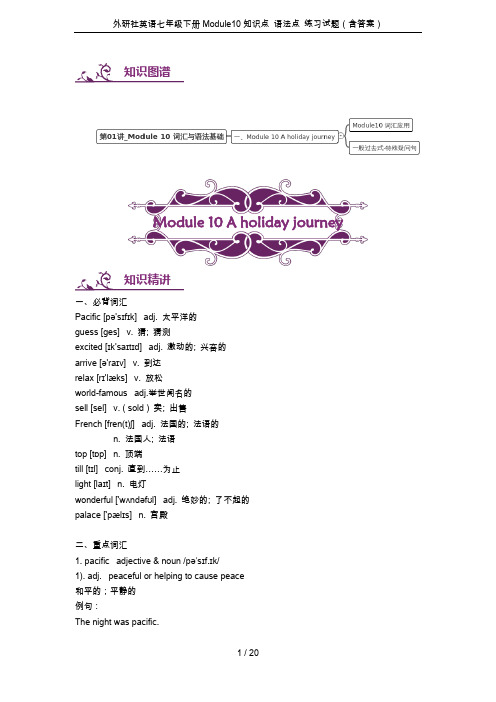
知识图谱Module 10 A holiday journey知识精讲一、必背词汇Pacific [pə'sɪfɪk] adj. 太平洋的guess [ges] v. 猜; 猜测excited [ɪk'saɪtɪd] adj. 激动的; 兴奋的arrive [ə'raɪv] v. 到达relax [rɪ'læks]v. 放松world-famous adj.举世闻名的sell [sel] v. ( sold ) 卖; 出售French [fren(t)ʃ] adj. 法国的; 法语的n. 法国人; 法语top [tɒp] n. 顶端till [tɪl] conj. 直到……为止light [laɪt] n. 电灯wonderful ['wʌndəfʊl] adj. 绝妙的; 了不起的palace ['pælɪs] n. 宫殿二、重点词汇1. pacific adjective & noun /pəˈsɪf.ɪk/1). adj. peaceful or helping to cause peace和平的;平静的例句:The night was pacific.黑夜静悄悄的。
He developed a pacific disposition in his childhood.童年时他养成了温和的性情。
2). n. Pacific Ocean 太平洋例句:The spacecraft splashed down in the Pacific.那艘宇宙飞船溅落在太平洋中。
They must think you are a madman if you tell them you want to cross the Pacific on a raft. 如果你告诉他们你要乘木筏横渡太平洋,他们一定会认为你是个疯子。
2. excited adjective /ɪkˈsaɪ.tɪd/feeling very happy and enthusiastic 兴奋的;激动的例句:Are you getting excited about your holiday?要去度假了你是不是很兴奋啊?An excited crowd waited for the singer to arrive.一群人怀着激动的心情等待着歌星的到来。
八年级上册英语Module10知识清单

Module 10 The weather词汇精讲1. joke(1) joke可作动词,意为“开玩笑;说笑话”。
例如:Don’t get mad. I was only joking. 别生气,我只是在开玩笑。
You don’t joke with him. 你不要和他开玩笑。
(2) joke还可作名词,意为“笑话;玩笑”。
例如:She told us some very funny jokes. 她给我们讲了一些非常滑稽的笑话。
【拓展】(1) Are you joking? / You’re joking!是常用口语,常用来表示说话人对对方所说的话感到惊讶或者不相信。
例如:— Are you getting a new car this year? 你今年要买辆新车吗?—You’re joking! I can’t afford to buy a car at all. 你在开玩笑吧!我根本买不起车。
(2) play a joke on sb. 取笑某人make a joke讲笑话2. snowysnowy是形容词,意为“多雪的;下雪的”。
它的名词形式是snow,意为“雪”;动词形式是snow,意为“下雪”。
形容词用来作表语或定语,名词用来作主语或宾语,动词用来作谓语。
例如:If it’s snowy, you should stay indoors. 如果下雪,你应该待在室内。
We have a very snowy winter this year. 今年我们拥有一个多雪的冬天。
【拓展】在名词词尾加-y构成形容词,类似的词还有:rain—rainy 雨—下雨的sun—sunny 太阳—晴朗的luck—lucky 幸运—幸运的wind—windy 风—刮风的snow—snowy 雪—下雪的3. althoughalthough的意思相当于though,意为“尽管,虽然”,用来引导让步状语从句。
- 1、下载文档前请自行甄别文档内容的完整性,平台不提供额外的编辑、内容补充、找答案等附加服务。
- 2、"仅部分预览"的文档,不可在线预览部分如存在完整性等问题,可反馈申请退款(可完整预览的文档不适用该条件!)。
- 3、如文档侵犯您的权益,请联系客服反馈,我们会尽快为您处理(人工客服工作时间:9:00-18:30)。
1.on holiday意为“在度假,在休假”。
go on holiday意为“去度假”,on表示“在(活动或旅行)中”。
【语境领悟】My parents are on holiday in Sanya.我父母在三亚度假。
We are going to Dalian on holiday next week.我们下周要去大连度假。
【学以致用】My family went to Hainan______ last winter.A. on a holidayB. on the holidayC. on holidayD. to the holiday【学以致用】用how long, how soon与how often填空—_____ _____do you go home?—Once a week.—_____ _____will they come back?—they'll come back in two weeks.—_____ _____did you live there?—For seven years.7年。
【拓展】how long还可用于对物体的长度进提问,意为“多长”。
一How long is the bridge?这座桥有多长?—It' s about100 metres.大约100米长。
— ______did it take J. K. Rowling to write: the Harry Potter series?—Over 15 years.A. How soonB. How oftenC. How longD. How far3. drive sb.to.….意为“开车载某人去,介词 to后接地点名词,若跟here, there或home等副词,则不用to 。
【语境领悟】My father drives us to school every day. 我父亲每天开车送我们去学校。
Who will drive me there? 谁会开车送我到那里?【拓展】drive to意为“开车去…”drive to the park开车去公园drive to work开车去上班【学以致用】1)—your teacher home?— Yes, she does.A. Do; driveB. Does; driveC. Do; drivesD. Does; drives2). Could you please __________home, Jim? It's too late.A. to drive me toB. to drive meC. drive me toD. drive me3).It only _______ him 20 minutes _______ to his office every day.A. takes; to driveB. took; driveC. takes; driveD. took; to drive4. excited形容词,意为“激动的;兴奋的”。
excited常用于be, become, feel等连系动词后面作表语。
be excited about意为“对……感到兴奋”,be excited to do sth.意为“对做某事感到兴奋”。
【语境领悟】Children's Day is coming. The children are very excited.儿童节快到了,孩子们很兴奋。
I was very excited to hear the good news.听到那个好消息我非常兴奋。
辨析: excited与exciting【学以致用】1) I'm very _______ (excited/exciting) about going to the movies.要去看电影,我感到很兴奋。
2) It‘s an ________(excited/exciting) movie.它是一部激动人心的电影3) —Did you watch the first match of the Russian World Cup?—Of course! We were so __to watch the __match.A exciting: excitedB excited: excitedC exciting: exciting D. excited; exciting5. arrive不及物动词,意为“到达”。
常与介词in或at连用。
表示到达国家、城市等大地方时,用介词in;表示到达村、镇、车站、机场等小地方时,用介词at。
若接地点副词, arrive后不加介词。
【语境领悟】When did Miss Gao arrive?高小姐是什么时候到的?They arrived in Shanghai two days ago.他们两天前到达了上海。
We can arrive at the train station at two o'clock.我们能在两点钟挺达火车站。
【拓展】reach和get也可表示“到达”①reach及物动词,其后直接跟宾语,一般不接地点副词②get不及物动词,其后须接介词to,多用于口语中。
若接地点副词,则不用介词to。
【语境领悟】He reached Shanghai last month.他上个月到达了上海。
Write to me when you get to Chongqing.到了重庆给我写信。
I usually get home at half past five in the afternoon我通常下午5点半到家。
【学以致用】1)Hello! I'm very glad to see you. When________ you________ here?A. did; arriveB. will; arriveC. has; arriveD. are; arriving2)— If we are quick enough, we can ________before nine o'clock.— We don't need to ________the park so early.A. get to; getB. get; arrive inC. arrive; getD. arrive; arrive at3) .Long time no see ! When did you __________ Chongqing ?A. getB. arrive atC. arrive inD. reach to4).When did you home yesterday?A. reach toB. getC. arrive atD. arrive in6. by plane意为“乘飞机”,相当于by air。
“by+表示交通工具的名词”指乘坐某种交通工具时名词前不加任何修饰词。
该介词短语在句中作状语。
by bus乘公共汽车by train乘火车by bike骑自行车by taxi乘出租车【学以致用】1).Ben goes to work ________ and his sister goes to work ________.A. by car; on her bikeB. by a car; on her bikeC. by cars; by bikesD. by his car; by bike2).How do you go to work, _____ bike or ____ foot?A. by, byB. by, onC. on, onD. on, by3).Mr. Zhang will go there underground and I will go there a bus.A. by; byB. on; byC. by; onD. on; on4) You can go to the small island(岛)______.A. by boatB. on boatC. by the boatD. by a boat7. sell及物动词,意为“卖;出售"。
sell sb. sth.或sell sth.to sb.意为“卖给某人某物”。
sell的反义词是buy, buy sb. sth.或buy sth. for sb.意为“给某人买某物”。
【语境领悟】My uncle wanted to sell his car.我叔叔想卖掉他的汽车。
Could you sell the stamp to me?你能把这枚邮票卖给我吗?【学以致用】1).—Does the bookstore math books?—Yes. Do you want to______ one?A. sell; buyB. sell; sellC. buy; buyD. buy; sell2). It is silly you your car at such a low price.A. for; to sellB. of; to sellC. for; sellD. of; sell3). You can_______ books _______the bookstores.A. sell; toB. buy; fromC. sell; fromD. buy; for8.such此处用作形容词,意为“这样的,如此的”,常在句中作定语修饰名词such修饰名词,常用结构有:①such+a/an+形容词+可数名词单数It's such a beautiful flower.这是一朵如此漂亮的花②such+形容词+不可数名词It is such fine weather today.今天天气这么好。
③such+形容词+可数名词复数They are such good students.他们是这样好的学生。
【注意】so用作副词,也可表示“如此”,修饰形容词或副词【自主归纳】such与so的不同【学以致用】1).I can't believe _______ a little girl can write _______ well.A. so; soB. such; suchC. so; suchD. such; so2)(2015•四川眉山)—Mom, can I do much work in a short time? —Dear, I think you can.A. so; soB. such; soC. so; suchD. such; such9. till conj. 直到……为止【语境领悟】*We waited till all the lights were on.我们一直等到所有的灯都亮起来。
